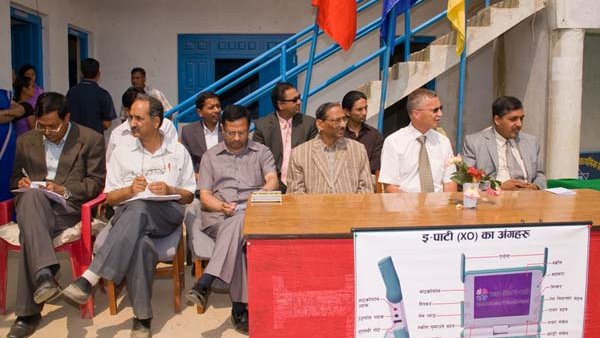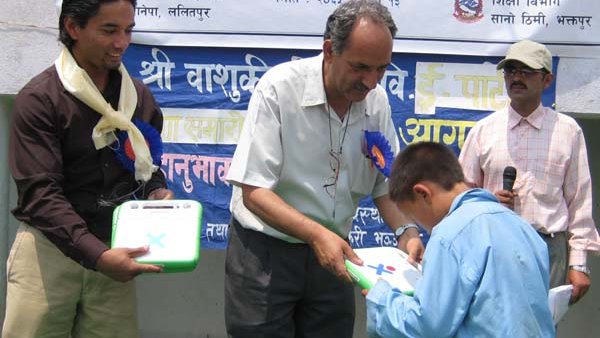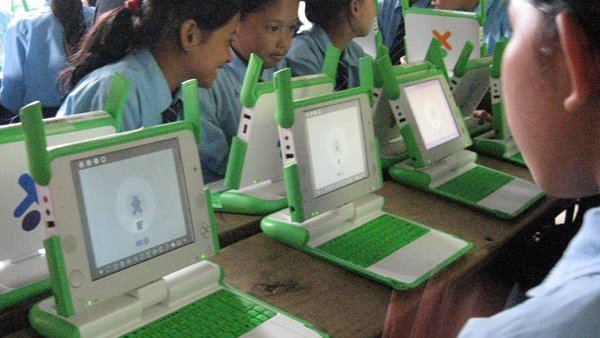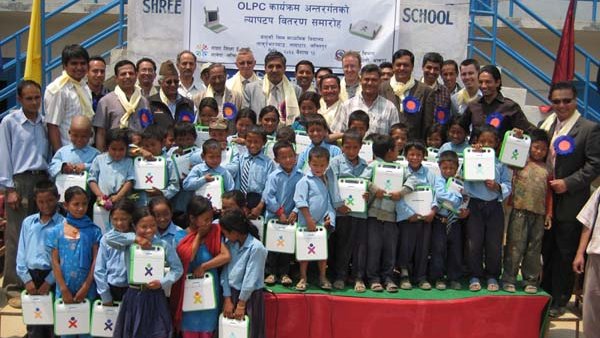On April 25, 2008, Open Learning Exchange Nepal (OLE Nepal) distributed a total of 135 OLPC laptops to grade 2 and 6 students from two schools in the outskirts of Kathmandu Valley. These were addition to the 22 laptops that were handed out to teachers from the schools during the teacher preparation program held a month ago. The laptop project was undertaken in partnership with Nepal government's Department of Education (DoE). This project is part of OLE Nepal's mission to increase quality of education while reducing current disparity in access and quality between school types, regions, and population groups by integrating ICT-based education in daily teaching-learning process. The laptops for the project were donated by the Danish IT Society in Copenhagen.
The distribution program started in the morning at Bashuki Lower Secondary School in Lakuribhanjyang, Lamatar VDC in Lalitpur district. As guests made their way up the dusty gravel road leading up to the school, students, teachers, parents, and community members waited anxiously for the program to begin. OLE Nepal team was there ahead of others with the laptops, and was busy helping with the program setup. Guests were given a short tour of the school that highlighted the internal wireless network, the wireless radio network that connected the school to the DoE and OLE Nepal office, the power arrangements including the power racks, the school server, and the classrooms where seating was arranged to encourage interaction.

The Chief Guest of the program was the Secretary of Ministry of Education and Sports Mr. Balananda Poudel. The secretary is the highest level civil servant in the ministry. Other special guests included Executive Director of Curriculum Development Center Mr. Haribol Khanal, Executive Director of National Center for Education Development Mr. Ram Swaroop Sinha, Director of DoE, Mr. Mahashram Sharma, Chief District Education Officer Mr. Babu Kaji Karki, Lalitpur Minister Counselor of the Danish Embassy Mr. Ove Larsen, Chairperson of the OLE Nepal Board of Directors Dr. Prativa Pandey. The program was widely covered by journalists from major media outlets including print and TV.

After the welcome speech and few words by the special guests, we proceeded to hand out laptops to the 75 lucky students. The kids were quite excited when they were handed the laptops. They immediately went back to their seats and opened the laptops, and with the help of OLE Nepal team members, they started checking out the activities that were in the laptops. While journalists, photographers, and cameramen were busy capturing the moment, the students were already showing off what they had discovered to their friends. It was quite interesting to see how they handled the laptops with care, and it was obvious that they greatly valued their newly received education tool.

After few photo ops we headed to the next school, Bishwamitra Ganesh Lower Secondary School in Jyamirkot, Lubhu VDC, Lalitpur. After a brief stop for lunch at the bottom of the hill, we arrived at our destination where the teachers offered us a warm welcome with garlands and flowers. At this school, we handed out 60 laptops to the students. The reactions from the students were similar to that of the Bashuki.
After the long and arduous day, we trudged back to our office in the evening with a great sense of accomplishment, but knowing too well that our real work had just begun. A lot of questions still loom in our minds. How will the children take care of the laptops? Will the network be able to handle the traffic when 70 children try to access the Internet together? Will the laptops have hardware problems? Will the teachers be able to successfully integrate the new teaching method in daily teaching? This is, after all, the test phase of the project, where OLE Nepal, along with the Department of Education hopes to find answers to the questions surrounding challenges in implementation. The plan is to use the findings to prepare a scalable model that can be replicated when we expand to schools in other districts.

The laptops have finally reached their destination. They have come a long way, and was made possible only through the contribution and hard work of many individuals and organizations. One Laptop Per Child has to be credited for defying the critics and coming up with this amazing piece of machine that we believe will transform education around the world. We owe our gratitude to the Danish IT Society for providing the laptops for Nepal's test phase. We hope that with a successful implementation of this phase, we can expect similar support in the future phases. Special thanks go to Dr. Richard Rowe and his team at OLE Inc in Cambridge, USA, for the constant support and guidance, the Danish Embassy in Kathmandu for supporting the project, and Corelatus, Sweden, for providing the funds to network the schools. We cannot end without mentioning that we have been blessed with a dynamic group of individuals that comprise our Board of Directors.
We have not cut any corner in our preparation building up to the deployment of the laptops. We put in a lot of effort in preparing the teachers in both schools, including the 4-day residential training program. We have paid close attention to each of the learning activities we have built. Our team put in endless hours preparing the laptops. We have spent a great deal of time setting up the wireless network. We built special power racks to charge the laptops with ease. We designed sturdy bags that have compartments for the laptops. But, we all know that there will always be unforeseen problems and challenges. With the dedication of our team and the cooperation from the schools and the communities, I am confident that we can tackle each challenge that we shall face, and move forward.
Rabi Karmacharya
Executive Director